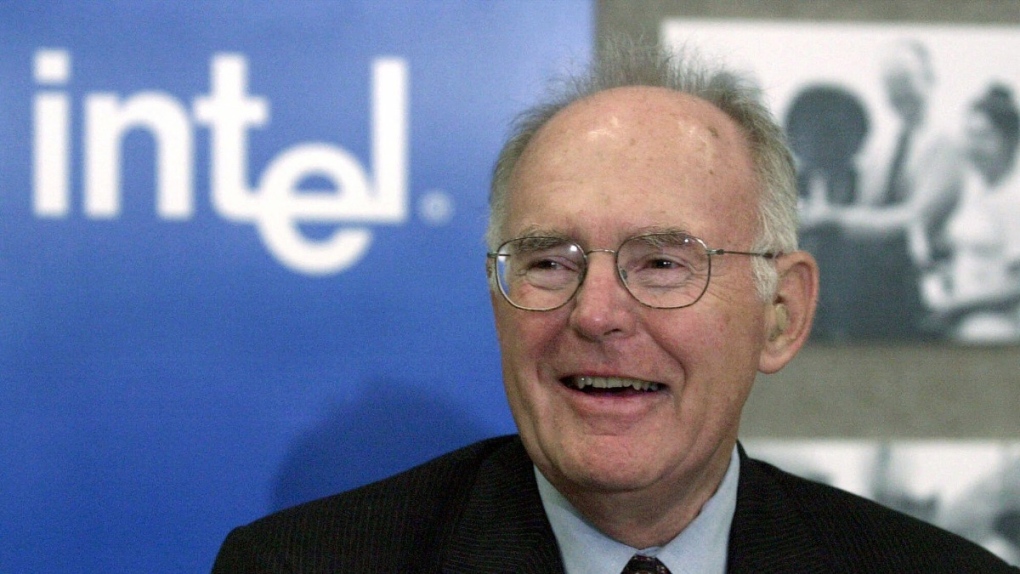SAN FRANCISCO -
Gordon Moore, the Intel Corp. co-founder who set the breakneck pace of progress in the digital age with a simple 1965 prediction of how quickly engineers would boost the capacity of computer chips, has died. He was 94.
Moore died Friday at his home in Hawaii, according to Intel and the Gordon and Betty Moore Foundation.
Moore, who held a Ph.D. in chemistry and physics, made his famous observation -- now known as "Moore's Law" -- three years before he helped start Intel in 1968. It appeared among a number of articles about the future written for the now-defunct Electronics magazine by experts in various fields.
The prediction, which Moore said he plotted out on graph paper based on what had been happening with chips at the time, said the capacity and complexity of integrated circuits would double every year.
Strictly speaking, Moore's observation referred to the doubling of transistors on a semiconductor. But over the years, it has been applied to hard drives, computer monitors and other electronic devices, holding that roughly every 18 months a new generation of products makes their predecessors obsolete.
It became a standard for the tech industry's progress and innovation.
"It's the human spirit. It's what made Silicon Valley," Carver Mead, a retired California Institute of Technology computer scientist who coined the term "Moore's Law" in the early 1970s, said in 2005. "It's the real thing."
Moore later became known for his philanthropy when he and his wife established the Gordon and Betty Moore Foundation, which focuses on environmental conservation, science, patient care and projects in the San Francisco Bay area. It has donated more than US$5.1 billion to charitable causes since its founding in 2000.
"Those of us who have met and worked with Gordon will forever be inspired by his wisdom, humility and generosity," foundation president Harvey Fineberg said in a statement.
Moore was born in California in 1929. As a boy, he took a liking to chemistry sets.
After getting his Ph.D. from the California University of Technology in 1954, he worked briefly as a researcher at Johns Hopkins University.
His entry into microchips began when he went to work for William Shockley, who in 1956 shared the Nobel Prize for physics for his work inventing the transistor. Less than two years later, Moore and seven colleagues left Shockley Semiconductor Laboratory after growing tired of its namesake's management practices.
The defection by the "traitorous eight," as the group came to be called, planted the seeds for Silicon Valley's renegade culture, in which engineers who disagreed with their colleagues didn't hesitate to become competitors.
The Shockley defectors in 1957 created Fairchild Semiconductor, which became one of the first companies to manufacture the integrated circuit, a refinement of the transistor.
Fairchild supplied the chips that went into the first computers that astronauts used aboard spacecraft.
In 1968, Moore and Robert Noyce, one of the eight engineers who left Shockley, again struck out on their own. With US$500,000 of their own money and the backing of venture capitalist Arthur Rock, they founded Intel, a name based on joining the words "integrated" and "electronics."
Moore became Intel's chief executive in 1975. His tenure as CEO ended in 1987, thought he remained chairman for another 10 years. He was chairman emeritus from 1997 to 2006.
He received the National Medal of Technology from President George H.W. Bush in 1990 and the Presidential Medal of Freedom from President George W. Bush in 2002.
Despite his wealth and acclaim, Moore remained known for his modesty. In 2005, he referred to Moore's Law as "a lucky guess that got a lot more publicity than it deserved."
He is survived by his wife of 50 years, Betty, sons Kenneth and Steven, and four grandchildren.








































